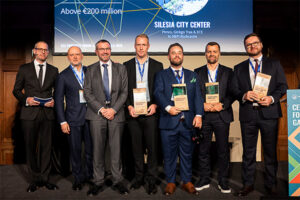ACROSS: THE FIRST HALF OF 2025 WAS VERY SUCCESSFUL FOR NEPI ROCKCASTLE. TO WHAT EXTENT ARE MACROECONOMIC UNCERTAINTIES INFLUENCING THE DEMAND FOR HIGH-QUALITY RETAIL SPACE AT THE MOMENT?
MAREK NOETZEL: The market today is shaped by two forces moving in opposite directions. On the one hand, macroeconomic factors have been quite supportive. We have seen GDP growth, real wage increases, and stabilizing, or even falling, interest rates in many of our markets. This combination has put more disposable income into the hands of consumers, which can be seen at our shopping centers – where turnover growth has exceeded inflation.
On the other hand, we cannot ignore geopolitical uncertainties. They cast a shadow over sentiment, both among consumers and investors. When we look at demand for high-quality retail space, we see a split picture: For assets such as convenience shopping centers and retail parks, the market is very liquid. Many of those assets are changing hands because investors still see them as safe and manageable investments.
For large-scale assets, however, it is a different story. Transactions above €300 million – such as major malls like Magnolia Park and Silesia City Center in Poland, which we acquired last year – have only taken place off-market. The pool of potential buyers is limited, and sellers prefer to approach those few directly rather than launch a competitive tender. In the past, properties of that size would have been sold through open-market processes that contributed to yield compression. Today, most deals are driven by necessity rather than opportunity: funds reaching maturity, shifts in investor strategies, or exits from specific regions. That is a clear change in the market.

Marek Noetzel
Chief Operations Officer at NEPI Rockcastle
ACROSS: THAT SOUNDS VERY DIFFERENT FROM WHAT WE SEE IN WESTERN EUROPE.
NOETZEL: Yes, the situation is, indeed, different. In Germany, for example, GDP has contracted, which is a concern for us because our economies in Central and Eastern Europe are closely tied to Germany. We are watching the fiscal stimulus measures there very carefully. A strong Germany is essential for our region.
However, in Poland, Romania, Hungary, and Slovakia, the story is more positive. Those economies are still growing, often by 3% or more per year. It may not sound spectacular, but when you compound 3% annual growth over five years, it adds up to more than 15%. That is a powerful multiplier effect.
Another key factor is the structural undersupply of modern retail space. In Western Europe, high streets play an important role in retail markets. In our region, they are almost non-existent, with the exception of a few locations in Prague or Budapest. Shopping centers are the dominant retail format and social hubs in CEE. They serve functions far beyond shopping, including entertainment, dining, public services, and community interaction. This multi-functionality makes them extremely resilient across market cycles and attractive to both consumers and retailers.

ACROSS: YOUR NET OPERATING INCOME INCREASED BY MORE THAN 12%, AND YOUR PORTFOLIO VALUATION EXCEEDED €8 BILLION. WHAT WERE THE MAIN DRIVERS OF THOSE RESULTS?
NOETZEL: Our strong financial results in the first half of this year were mainly driven by a combination of our major acquisitions and like-for-like net operating income growth. Acquiring Magnolia and Silesia in Poland added around €29 million in income in just the first half of the year. On a like-for-like basis, our growth was 4.4%, which is very solid in the current macroeconomic climate. The drivers varied by country. In Poland, improved cost management and reconciliations with tenants played a role. In Lithuania, we restructured spaces and introduced new tenants at higher rents, which boosted income.
Then there are flagship redevelopments. Paradise Center in Sofia is a prime example. We closed and completely rebuilt the basement level, improved footfall circulation, and attracted stronger tenants such as Inditex. The center is performing exceptionally well, far exceeding expectations.
In Krakow, Bonarka has been undergoing a €75 million refurbishment. It has been like open-heart surgery, but we are now seeing the benefits as new stores open. In Liberec, the shopping center we acquired from Tesco had been neglected for years. Since our takeover, thanks to a refurbished cinema, new food court, and strong international tenants, it has been transformed into a high-quality destination.
The common theme is that we invest in our properties, upgrade them, and reposition them. Each makes a contribution, and together they generate the growth you see in our numbers.
ACROSS: YOUR OCCUPANCY RATE IS EXTREMELY HIGH, WITH A VACANCY OF ONLY 1.6%. WHAT IS BEHIND THAT SUCCESS?
NOETZEL: There are several factors. First, our scale makes us a natural partner for international retailers entering the region. With 60 properties across eight countries, anyone who wants to expand in Central and Eastern Europe must talk to us.
Second, we have built a strong leasing organization. With Justyna Bartosz as our Group Head of Leasing, we now have dedicated leadership that focuses on cross-selling, key account management, and building long-term partnerships.
Third, we invest in relationships. Our annual Retailers Day, for example, has become a must-attend event. It is not just about socializing – it creates real business. After our last event, one of the tenants accelerated the decision to enter Bulgaria. That was the direct result of building trust and providing market insights.
Finally, we manage vacancy very actively. When you look at our 1.6% vacancy rate, it represents quite a few sqm of a portfolio of over 2 mn sq m of GLA. That’s a huge operational effort. Most of our current vacancy, however, is linked to refurbishments, such as Arena in Zagreb or Budapest. Once the works are completed and new anchors like Zara open, vacancy will fall even further. We are confident that we can bring it below 1%.

ACROSS: HOW DO YOU SEE CONSUMER BEHAVIOR EVOLVING, AND HOW DO YOU ADAPT YOUR TENANT MIX?
NOETZEL: Consumer behavior is becoming more selective. People shop less frequently but spend more per visit. Our average basket spend has increased sharply, partly because of the Magnolia and Silesia acquisitions, where customers spend more than €30 on average – double the portfolio average.
Beyond the statistics, we see a clear trend: Customers want more than shopping. They want experiences. That is why entertainment and leisure are becoming central to our strategy. Take Promenada Bucharest: The expansion will include a recliner cinema, Romania’s first commercial theater, a high-end fitness center, a swimming pool, a hotel, and offices. This combination will transform the center into a mixed-use destination where people can work, shop, dine, exercise, and be entertained – all in one place.
We are also upgrading food courts into full-service restaurant clusters and adding more outdoor spaces for leisure. The goal is to create places where people want to spend their time, not just run errands. That is how we future-proof our assets.

ACROSS: SUSTAINABILITY IS ANOTHER KEY PILLAR. WHAT PROGRESS HAVE YOU MADE WITH YOUR PHOTOVOLTAIC PROGRAM?
NOETZEL: We are very proud of this initiative. We have already installed photovoltaic systems on every rooftop where it was technically possible. The next step involves two greenfield solar farms in Romania, with capacities of 50 MW and 100 MW.
Those plants will not only cover our own energy needs, they will generate more electricity than we consume. That will make us a significant energy producer in the Romanian market.
Financially, the returns are outstanding. We expect over 20% IRR. Each euro we used to spend on energy will now become revenue. It is both good business and the right thing to do for the environment. Energy is now firmly one of our four strategic pillars, alongside ‘ retail operations, refurbishments, and disciplined growth.

ACROSS: WHAT PROJECTS IN YOUR PIPELINE ARE YOU MOST EXCITED ABOUT?
NOETZEL: Promenada Bucharest is the flagship – a project of extraordinary scale and complexity. It will redefine the retail landscape of the Romanian capital.
In Krakow, Bonarka’s transformation is nearing completion. We are relocating the food court, upgrading interiors, and redesigning parking. Our aim is to make the customer experience feel like entering a four-star hotel from the moment you arrive.
Arena Mall in Budapest is also a priority. We are investing not only in the interior, but also in the outdoor areas, creating new green spaces, activities for families, and food clusters. The weather is great in Budapest, and we want to capitalize on that.
Our Pogoria project in Poland, though smaller at 5,000 sqm of added GLA, is also important. It has exceeded our income expectations and will open early next year. Beyond that, we are preparing new projects in Plovdiv and Galati in the Bulgarian and Romanian markets, which are awaiting building permits. They will be tailored to local demand – with Plovdiv formatted as a large shopping center and Galati more like a retail park.
Finally, we are planning expansions of Magnolia, Silesia, and Copernicus, with a combined CapEx of more than €100 million. These are major, long-term investments in some of our strongest assets.

ACROSS: HOW ARE THESE PROJECTS FINANCED?
NOETZEL: We finance projects at a corporate level, primarily through bonds. That gives us flexibility and speed. All ongoing projects – Promenada, Bonarka, Arena, and Pogoria – already have secured financing.
The strength of our balance sheet allows us to act quickly. If an acquisition opportunity arises, we can execute it immediately and refinance later. That gives us an advantage in negotiations, as we do not need to make offers conditional on financing.
ACROSS: LOOKING AHEAD, WHAT ARE YOUR PLANS FOR THE NEXT THREE TO FIVE YEARS?
NOETZEL: We will continue with our four-pillar strategy: extract value from existing assets, expand our energy business, pursue selective developments, and maintain discipline in acquisitions.
Residential is an opportunistic addition. Where we have excess land next to shopping centers, we will develop it. Our first project in Bucharest delivered more than 30% returns, so we know it works. But residential development will never become our core business.
Retail parks are interesting, especially dominant ones in large urban agglomerations, but the sector is currently oversupplied in Poland. Outlets are less likely for us, as they require very specific know-how and management models.
We are also watching the data center sector. With our access to energy, it could be a natural fit in the long term. For now, our focus remains firmly on retail. That is what our investors expect and value.

ACROSS: WHAT CHALLENGES DO YOU SEE ON THE HORIZON?
NOETZEL: Macroeconomic and geopolitical uncertainties will remain. Fiscal tightening in Romania could impact consumption. Global shocks, like another financial crisis or pandemic, are always possible.
We mitigate such risks by maintaining a conservative balance sheet with low leverage. That allows us to weather economic and market storms. Our strategy is to take little risks – but consistently and over time, which pays off.
On the positive side, if peace is achieved in Ukraine, the entire region will benefit from renewed investor confidence. Our retail markets are fundamentally strong and still underpenetrated. That gives me confidence in the long-term outlook.
ACROSS: FINALLY, RÜDIGER DANY WILL STEP DOWN AS CEO IN SPRING 2026. CAN YOU GIVE US AN UPDATE ON THE SUCCESSION PROCESS?
NOETZEL: The board has engaged an international search firm to run the process. There is one internal candidate, and the process is ongoing. It is being managed with full transparency and the highest governance standards. The company is in very good shape: It has a strong team and a clear strategy.







